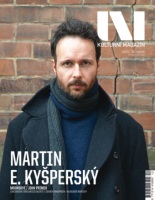
DRÁPAL, V. / KONOPÁSEK, Z. (2021): Zdeněk Konopásek Doktor Konopný (rozhovor Vladimíra Drápala se Zdeňkem Konopáskem). Magazín UNI, 12/2021. Dostupné na adrese: https://www.magazinuni.cz/hudba/zdenek-konopasek-doktor-konopny/
::::Rozhovor, který vedl Vladimír "Lábus" Drápal z nakladatelství Guerilla Records - především o kapele Dvouletá fáma, od jejíhož založení uplynulo 40 let, ale nejenom.
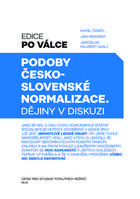
BARTLOVÁ, M. / BÍLEK, P. / KONOPÁSEK, Z. / REIFOVÁ, I. (2017): Diskuze o interdiciplinárních přístupech k normalizaci. In: K. Činátl, J. Mervart & J. Najbert, eds: Podoby česko-slovenské normalizace: Dějiny v diskusi. Praha: ÚSTR/NLN. Str. 81-101
::::
KONOPÁSEK, Z. / KAREL, R. (2016): Kudy vedla cesta ke zcela osobitému pojetí vaší hudby? (rozhovor Romana Karla se Zdeňkem Konopáskem). In: Quod bene notandum - Liber secundus. Bruntál: J7K5/JeseKápě. Str. 125-126
::::Rozhovor ke kapele Noční pták a k jejímu vystoupení v SVČ Rýmařov při výroční výstavě Volného sdružení Octopus, dne 6. srpna 2016.
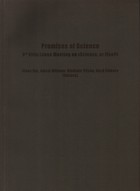
KONOPÁSEK, Z. (2007): The language metaphor in sociology - two different trajectories. In: A. Wittwer, E. Kut, V. Pliska & G. Folkers, eds.: Approaching scientific knowledge: Metaphors and models. Zurich: Collegium Helveticum. Str. 35-42
::::Metafora jazyka patří mezi vlivné metafory v sociologii. Podle Browna jde vlastně o klíčovou metaforu (root metaphor), protože ji používáme jako zcela běžné, často ani nevyslovené obecné zarámování toho, jak si představujeme sociální struktury a procesy, jak je pozorujeme a studujeme. Pro řadu sociologů nejsou sociální jevy jako jazyk, ale vlastně jsou jazykem. Chápat skutečnost jako jazyk či jazykové projevy však může znamenat velmi různé věci; a různé pojetí jazykové metafory se také promítá velmi různým, často rozporným způsobem do sociologické teorie a metodologie. Pro někoho vede metafora jazyka nevyhnutně k významné a politováníhodné redukci: jako sociologicky podstatná se pak přijímá pouze malá část skutečnosti, vlastně jen texty a jazykové promluvy, zatímco zbytek je ponechán stranou. Jiní sociologové berou za svou metaforu jazyka poněkud jinak, vlastně protikladně. Uplatňují to, co o povaze a fungování jazyka víme, na v zásadě kterýkoli prvek tzv. mimo-jazykové skutečnosti. Realita tak není redukována na texty, ale učíme se (nejrůznější) realitě rozumět jako něčemu jazykovému, textuálnímu. V tomto textu tyto dva protichůdné přístupy načrtávám a vysvětluji, abych předvedl jak různý význam může ve vědeckém používání (dokonce v rámci jediné disciplíny) zdánlivě tatáž metafora.
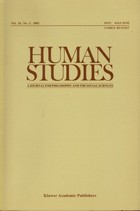
KONOPÁSEK, Z. / KUSÁ, Z. (2006): Political screenings as trials of strength: Making the communist power/lessness real. Human Studies, 29 (3): 341-362
::::In this paper we discuss the problem of communist power in so called totalitarian regimes. Inspired by strategies of explanation in contemporary science studies and by the ethnomethodological conception of social order, we suggest that the power of communists is not to be taken as an unproblematic source of explanation; rather, we take this power as something that is itself in need of being explained. We study personal narratives on political screenings that took place in Czechoslovakia in 1970 and analyze how the power of communists obtained its strength from ordinary and “unremarkable” interactions between participants. The screenings are interpreted, in the terms of Bruno Latour, as “trials of strength.” We show that it was crucial for all the participants that associations, translations or mobilizations involved in making the regime real, remained partial and multiple, and not exclusive and “total” as is often assumed within dominant discourses on totalitarianism.
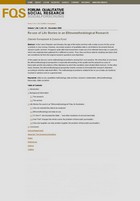
KONOPÁSEK, Z. / KUSÁ, Z. (2000): Re-use of life stories in an ethnomethodological research. Forum Qualitative Sozialforschung / Forum: Qualitative Social Research, 1 (3): 42 odst, čl. 24. Dostupné na adrese http://nbn-resolving.de/urn:nbn:de:0114-fqs0003248
::::In the Czech Republic and Slovakia, the age of life history archives with a wider access for the social scientists is only coming. However, secondary analysis of qualitative data is not limited to documents that are stored in public archives. It happens quite often that researchers make use of an interview transcript, or a part of it, which has originally been gathered for a different occasion. Thus, they use these data for studying new topics that are sometimes far from the original research questions and objectives. In this paper we discuss some methodological problems arising from such practice. We show that, on one hand, the ethnomethodological perspective is especially demanding on the quality and the pinpoint accuracy of transcripts and the descriptions of the interviews by which the narratives were elicited (field memos). On the other hand, however, the ethnomethodological perspective orients scholars to formulate their research objectives according to what the data itself offers. The methodological problems related to the re-use of data can hardly be resolved in advance and on a general level.
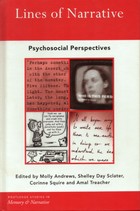
KONOPÁSEK, Z. / ANDREWS, M. (2000): A cautious ethnography of socialism: Autobiographical narrative in the Czech Republic. In: M. Andrews, S. D. Sclater, C. Squire & A. Treacher, eds.: Lines of narrative: Psychosocial perspectives. London & New York: Routledge. Str. 92-103 ::::
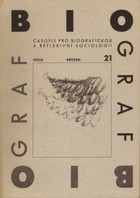
KONOPÁSEK, Z. (2000): O relativismu, biografickém výzkumu a pomocné ruce. Biograf (21): 91-100
(21): 91-100
::::
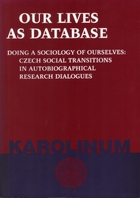
KONOPÁSEK, Z. (2000): Reflexive autobiographies: Interpreting the East - understanding the West. In: Z. Konopásek, ed.: Our lives as database: Doing a sociology of ourselves - Czech social transitions in autobiographical research dialogues. Praha: Karolinum. Str. 281-298
::::

KONOPÁSEK, Z. (2000): Grandma sociology (reconsidered). In: Z. Konopásek, ed.: Our lives as database: Doing a sociology of ourselves - Czech social transitions in autobiographical research dialogues. Praha: Karolinum. Str. 137-172
:::: 
 ? - recenze vyjde v časopise Biograf
? - recenze vyjde v časopise Biograf
 se objevily informace o tom, co lze snad prý během března čekat v nové, sedmé verzi mého oblíbeného analytického programu
se objevily informace o tom, co lze snad prý během března čekat v nové, sedmé verzi mého oblíbeného analytického programu







